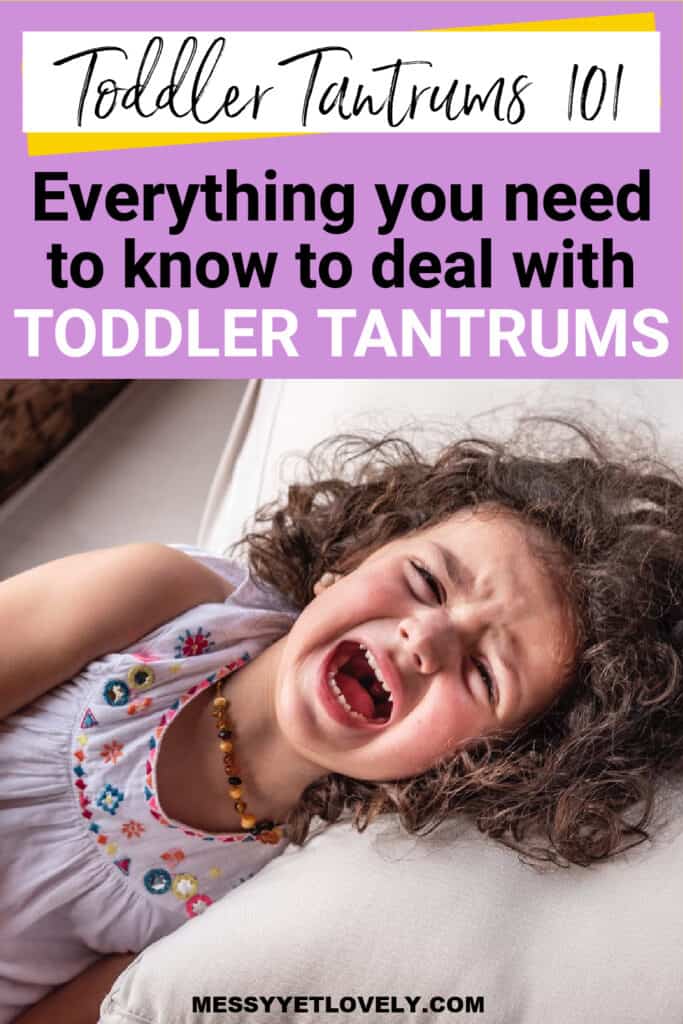Toddler tantrums are hard for both – parents and kids. It can be overwhelming and stressful, especially if tantrums break out in public places.
So the question is, why do kids have tantrums? And is it possible to avoid tantrums?
If you are wondering how you can stop your child from throwing tantrums over everything, let’s dig deep into what temper tantrums are and why kids have tantrums in the first place, so we can know how to manage it better.
WHAT ARE TEMPER TANTRUMS?
According to healthofchildren.com, a temper tantrum is defined as,
A tantrum is an episode of extreme anger and frustration characterized by crying, screaming, and violent body motions, including throwing things, falling to the floor, and banging one’s head, hands, and feet against the floor.
Temper tantrums are usually seen in kids aged between 1 and 4. It is most frequent in kids around the age of two – hence the name “terrible twos”.
WHY DO KIDS THROW TANTRUMS?
Young kids throw tantrums when they feel frustrated. Kids above the age of one are just learning to talk. Therefore, their ability to express themselves is very limited.
And also being young, their brain, specifically the prefrontal cortex, which does not develop fully until age 25, plays an important role in NOT helping with emotional regulation.
When babies become toddlers, they also learn that they are independent beings and they try to use this knowledge by showing their desire to test limits and assert themselves.
But they often do not get to express what they want effectively and even if they do, they are not always granted their wishes. Hence it results in emotional meltdowns.
Since they do not yet have the vocabulary or ability to express the boiling emotions and the emotional maturity to self-regulate, they burst out thrashing or simply wailing.
Tantrums can happen also when their needs are not met. And needs could be physical or emotional.

HOW TO AVOID TEMPER TANTRUMS?
Temper tantrums are not something you can avoid altogether.
You can avoid tantrums to a certain extent by regulating their eat-sleep schedule so as to make sure they have their physical needs met and therefore they are in a good mood.
But you may not be able to avoid all temper tantrums. And also, when a child is throwing tantrums, it means they need your help.
If we view tantrums as a call for help rather than an annoying behavior which we want somehow to stop (if you feel this way, I totally get you), tantrums give parents an opportunity to teach kids an important skill.
And that is proper emotional control.
It is inevitable that we deal with frustrations in life, and hence it is important to deal with the difficult emotions that arise from it.
In a way, tantrums are good for teaching so many lessons, both for kids and parents.
Tantrums help in releasing emotions and also is a means for parents to connect with kids by role modelling emotional maturity.
HOW TO REDUCE THE LIKELIHOOD OF TANTRUMS?
That being said, it’s not necessary that we invite tantrums when we can actually prevent it, as it can create a lot of unnecessary stress for both kids and parents.
Following are some steps you can take to make sure your toddler doesn’t have another blast when you are in the supermarket or in the middle of a party.
- Make sure their physical needs are met
Hungry, sleepless kids are more tired and even a small trigger can be overstimulating for them. Therefore, have a schedule, so that kids can expect what comes next and therefore feel safe and secure to an extent.
- Pick your battles carefully
When you are a parent or a caregiver who is well aware of the mood swings of your toddler, you can tell when a tantrum is on its way because you learn to be aware of what triggers them from past experiences.
So, do not say a NO when it’s a harmless request and make sure you give them choices whenever possible so they can feel in power.
- Plan beforehand
Plan the events of your day according to their meal times and nap times.
Going grocery shopping when it’s time for your toddler to nap is a bad idea. And also, keep in tune with their meal times and hunger pangs.
Carry healthy snacks with you if you are going out and make sure they are fed on time to reduce tantrums due to hunger.
- Give positive attention
The key to get good behavior from kids of any age is giving positive attention whenever you can. When they get plenty of attention, love and connection they do not resort to ways they can get negative attention.
Spend one-on-one time with them on a daily basis because kids who do not get positive attention try to get it through negative ways.
- Design a tantrum-free environment
If you know what triggers your toddler you can, to a certain extent (but not always), avoid tantrums.
For example, if you know your kid will ask for a cookie when they see it, do not put it on the table before they have food. Keep it out of sight.

WHAT TO DO DURING A TODDLER’S TEMPER TANTRUM?
The tips above can help to reduce the chances of toddler tantrums, but it will still happen, because toddlers are toddlers.
Here are some tips on how to deal with a temper tantrum when it’s happening.
- Calm down
This is not for the toddler, but for you. You have to be the calm in the storm to bring the situation under control and help the child ride the strong emotional wave.
Do not take the situation personally even if it seems to be targeted at you.
Remember, kids do not want to feel uncomfortable either. Feeling those big emotions are hard for them too.
Keep in mind the fact that it’s not you, but that’s the way kids express their emotions. Take a moment for yourself by taking a long deep breath and then talk.
Yelling at children or spanking them doesn’t help here as it can only increase the intensity of their reactions. And also it is bad modeling of behavior.
- Find out the why
There could be many reasons why your child is having a tantrum.
If it’s due to hunger or lack of sleep, you can take care of that.
If it’s because of any limits you set, stay calm and let them ride through the feelings while you offer emotional support.
You can let them know you are there for them. You are not their enemy. On the other hand, when they know that you are on their side, it will help them to go through the emotions easier.
- Acknowledge their feelings
Agree to what they are feeling by saying things like, “I can see that you are angry for not being able to play more time in the park”.
When their feelings are accepted as they are, it becomes easier for kids to come to terms with it.
When you are acknowledging how they feel in the moment, you are also accepting their emotions.
It’s not possible to control their emotions no matter what you do, so the easier thing to calm them down is acknowledgement and them realising that you are there for them no matter what.

- Make sure the tantrum run its course
Nobody has the time at hands to deal with another meltdown. But trying to rush through the tantrum to finish it off doesn’t help. Neither does trying to console the toddler with lots of words.
Remember they are wailing and screaming at the top of their lungs, so they are not hearing you.
Instead what can help is, staying calm and offering empathy and staying with them physically.
Kids usually throw tantrums with the people they feel the closest with. Even though it is not a pleasant feeling, you can feel loved by understanding that you are special to them and hence they reserved all those big emotions for you.
So only you can be the one to help them get through it. The emotional maturity and control we exhibit in such situations can go a long way when it comes to kids learning self-regulation later in life.
Kids learn by imitating and if you are a parent who is impatient and angry most of the time, kids learn that too.
So what we can do here is to respect their feelings and wait patiently to let them finish the tantrum.
- Interfere physically
Physical doesn’t mean hitting them or yelling to stop. I have seen parents doing this only to aggravate the emotional response of the toddler.
He feels more helpless and may even feel abandoned because of the lack of connection there.
If you want our kids to come to us when they experience hard times, refrain from physical punishment when they express such strong emotions.
If your kid is acting out in the public, you can carry him out physically and go to a place where you can be comfortable and alone. If you have no other place to go, go to your car.
Hugging also helps to calm down a child during tantrum. Hugging works with kids of older age too. This simple physical act offers a lot of comfort and reassurance for your child.
It helps to release emotions and also be comforted at the same time. Hugging helps in releasing oxytocin which are feel-good chemicals that help in calming down.

- Be empathetic and firm at the same time
If the toddler broke down because of not getting what they wanted and if it’s inappropriate, stand firm on your ground no matter how much they protest.
If you give in to the emotions, they learn very well to do it again.
So if they are having a hard time, you can express empathy like,
I know you would like to eat that cookie right now, but momma has to make sure you eat something healthy before eating that.
I would feel angry if I were you too.
You can also use tantrums as opportunities to teach them the name of various emotions.
When you are being empathetic and talk for your child, you are also voicing their emotions as words, which helps them to express their feelings in words.
This helps them to learn about different emotions and name them as they grow up. This is part of understanding what they feel and regulating it.
You can also teach her how she can use words instead of hands and legs.
- Stay consistent
If they are crying to gain something, don’t give in when they throw tantrums.
You can empathise with their feelings at this time, saying,
I am sorry you wanted to play for more time. If I were you I would want that too.
And act firmly. When you are being consistent in different situations, they learn what to expect and thus behave accordingly in the future.

SHOULD YOU IGNORE TODDLER TANTRUMS?
I have heard parenting advice where it is said it is best to ignore toddler tantrums to not escalate it.
But I don’t agree with it. Toddlers do not throw tantrums deliberately. They do it because they have big intense feelings inside and they need to bring it out to let them go.
And since they lack the emotional control and regulation techniques, it’s hard for them to soothe themselves on their own. But when parents are beside them putting on a calm demeanor, they learn that they are supported and seen when they face difficulties.
They learn to feel and welcome emotions without prejudices. Giving emotional support only makes them feel safe and secure in their home environment.
If we do not feel safe expressing emotions with people we love, where else can we do it?
Ignoring tantrums may make kids feel abandoned when they most need you- that is, when they are experiencing difficult emotions.
Acknowledging emotions and offering empathy is NOT giving in to their behavior. Maybe they are crying because you said NO. But that doesn’t mean you have to be angry with them or ignore them.
You can try to understand their feelings while remaining calm. But that doesn’t mean you have to sit with them the whole time they are having tantrums. If they become aggressive, let them know that it’s not okay to hit.
You can let them know that you are with them and walk away, saying “I’ll be right back” or “I’ll be in the kitchen if you need me”, giving them some practice in self-soothing. And also make sure you check in with them after the storm has passed.
HOW LONG SHOULD A TANTRUM LAST?
According to Clevelandclinic.org, a temper tantrum should last only between 2 and 15 minutes.
And if tantrums last more than 15 minutes and if your toddler exhibits violent behavior, and if it is seen in kids aged above 5, it’s recommended to consult a childcare specialist or a psychologist since it could indicate a developmental problem.
In addition, if your child hurts people, damages properties, holds breath, or experiences stomach pain, headache, or anxiety, seek help.
More posts on parenting:
- 9 signs your child is not ready for potty training
- The ultimate guide to start potty training your child(all the tips and tools you need to succeed)
- How to get started with positive parenting
- 10 things a mom must do for her daughter
- Positive discipline : 15 positive discipline techniques that work!
- Motherhood anxiety: How to deal with anxiety as a mom
- 101 questions to ask kids for fun and to promote resilience and critical thinking
Like this post? Save for later!

